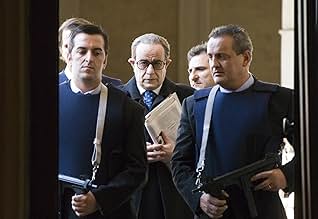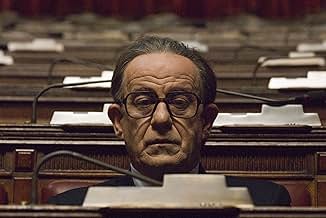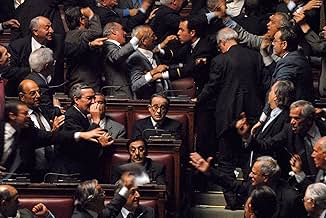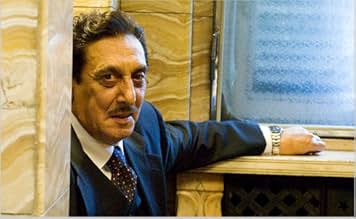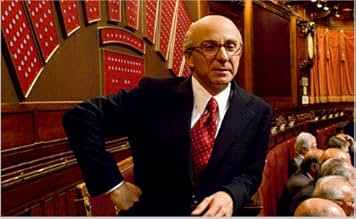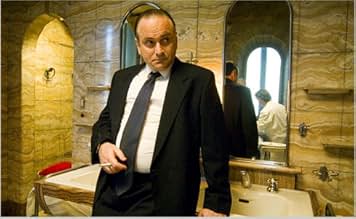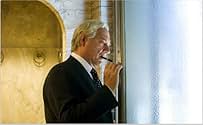Il divo
- 2008
- Tous publics
- 1h 50min
NOTE IMDb
7,2/10
20 k
MA NOTE
L'histoire du politicien Giulio Andreotti, qui a été Premier ministre de l'Italie à sept reprises depuis le rétablissement de la démocratie en 1946.L'histoire du politicien Giulio Andreotti, qui a été Premier ministre de l'Italie à sept reprises depuis le rétablissement de la démocratie en 1946.L'histoire du politicien Giulio Andreotti, qui a été Premier ministre de l'Italie à sept reprises depuis le rétablissement de la démocratie en 1946.
- Réalisation
- Scénario
- Casting principal
- Nommé pour 1 Oscar
- 32 victoires et 40 nominations au total
Avis à la une
This movie puts on screen what all Italians know since decades: directly or indirectly Andreotti is behind all major events happened in Italy in the last 45 years. This is what we know, as we all knew that virtually all politicians at all level were (and are) robbing the public funds and make private deals with business men.
The movie shows exactly this: we know it but we do not have the evidences.
Sorrentino tries to bridge this gap by putting together a lot of informations that make a pretty clear scenario, but without evidences. The result is a portrait of a divinity: you know that is there, you know that everything happens because of his will, but on earth everything happens by chance so that the fact that Andreotti is the mastermind of everything becomes a matter of divine faith.
The strength of the movie rests on the capacity to describe a personality that is so powerful that does not need to speak, does not need to go on TV, he is able to make things happen in a way that only Andreotti knows. Andreotti is above the politics, above the Church, above finance, above mafia, he is depicted as a power that stands on its own, someone who uses all the different leverages to rule.
Andreotti got it away with his trials and only Andreotti knows how. For a man of his power, it was the least you could expect.
At the end, Italians have to acknowledge that in the 20th century Italy was ruled by the King (shortly), Mussolini and Andreotti. But if you remember the Glossary shown at the beginning of the movie, through the Loggia P2, Sorrentino suggests that Berlusconi could be the person in charge to continue the job. Whether this is the will of Andreotti or not is a matter of faith.
The movie shows exactly this: we know it but we do not have the evidences.
Sorrentino tries to bridge this gap by putting together a lot of informations that make a pretty clear scenario, but without evidences. The result is a portrait of a divinity: you know that is there, you know that everything happens because of his will, but on earth everything happens by chance so that the fact that Andreotti is the mastermind of everything becomes a matter of divine faith.
The strength of the movie rests on the capacity to describe a personality that is so powerful that does not need to speak, does not need to go on TV, he is able to make things happen in a way that only Andreotti knows. Andreotti is above the politics, above the Church, above finance, above mafia, he is depicted as a power that stands on its own, someone who uses all the different leverages to rule.
Andreotti got it away with his trials and only Andreotti knows how. For a man of his power, it was the least you could expect.
At the end, Italians have to acknowledge that in the 20th century Italy was ruled by the King (shortly), Mussolini and Andreotti. But if you remember the Glossary shown at the beginning of the movie, through the Loggia P2, Sorrentino suggests that Berlusconi could be the person in charge to continue the job. Whether this is the will of Andreotti or not is a matter of faith.
Giulio Andreotti can be seen as both the precursor to, and the antithesis of, Silvio Belusconi: an Italian politician with his fingers on every lever that led to power, accused of everything but convicted of nothing, and yet peculiarly devoid of conventional charisma. A sense of a particularity, of a man who had become nothing beyond a carefully constructed defence of his own behaviour, was nicely captured in Tim Parks' fictional work 'Destiny'; and we get the same feeling in 'Il Divo', a biopic with an extraordinary performance Toni Sevillo by in the lead role. What neither offer is definitive, or even speculative, resolution of the enigma and his actions; just a chilling yet plausible portrait of the man. Yet without providing clear answers, something else must provide the story. In Parks' book, Andreotti was a bit part; in the film, there's no other narrative, and sometimes the direction feels a little too heavy, overdone perhaps because there isn't a smooth tale holding things together. And the music on the soundtrack seems deliberately incongruous, thrown into the mix to provide some variation in tone that would otherwise have been lacking. But Servillo's performance more than compensates; it will lead you wanting the same answers, one suspects, that everyone has wanted from Andreotti for a long long time.
Giulio Andreotti is the seven times Prime Minister of Italy leading the ruling Christian Democracy Party. In 1978, The Red Brigades kidnaps his rival former Prime Minister Aldo Moro. Andreotti refuses to negotiate and Moro is killed. Over the next 15 years, various people are mysteriously killed. In 1991, he's named Senator for Life. In 1992, he resigns as Prime Minister. His bid for the Presidency fails and he goes on trial for corruption with the Mafia.
I have one problem with this movie and it's a big one. I feel like I did a PhD on Italian politics watching this movie. The first half is nearly impossible to follow for someone like me who knows nothing about Italy during this time. It's a lot of style but I couldn't understand the substance. There are a lot of deaths but I don't know the significance of some of them. The second half is more compelling with the criminal trial. It becomes a character study and Andreotti is an intriguing character. I'm sure this movie is much more compelling for people with a background in Italian politics during this time. A lot of this is going over my head.
I have one problem with this movie and it's a big one. I feel like I did a PhD on Italian politics watching this movie. The first half is nearly impossible to follow for someone like me who knows nothing about Italy during this time. It's a lot of style but I couldn't understand the substance. There are a lot of deaths but I don't know the significance of some of them. The second half is more compelling with the criminal trial. It becomes a character study and Andreotti is an intriguing character. I'm sure this movie is much more compelling for people with a background in Italian politics during this time. A lot of this is going over my head.
I'm sure if I were raised in Italy and paid attention to Italian politics day in and day out all of what transpires in Il Divo would be no less than engrossing. The story of Androetti, the head of a government that went for seven administrations and then went on to run for President has some really fascinating things to it. One of those is seeing just how the parliament works in those scenes midway through the picture and how the country actually chooses its president, which is so far removed from the US democratic process it's hard to fathom. And I also admired how the actor playing Androetti so got into this kind of quietly conniving politician, a man who believed that politics was everything and yet would never get passionate enough to raise his voice above a whisper. Somewhere inside of him a Dick Cheney is rumbling, perhaps.
But the problem in watching the film if you don't pay attention to the Italian politics of the period, or just in general, is that the filmmakers lose you fairly quickly. I usually find myself a viewer who doesn't like to be spoon-fed information very simply, but this is on the opposite end of the cannon where only a few real details are clear enough and then the rest comes whizzing by at a quick clip (and quick indeed as the camera style is akin to the operatic nature of Scorsese, only not as talented or focused). Names of characters keep coming up as title cards, and except for a couple of names like "The Lemon" (Androetti's right-hand man), none of them really stick out, and the incidents keep piling up without any real connection. At some point the basic story does reveal itself and holds some interest, but there's a disconnect between many scenes too, and a sense of cross-cutting done a few times (i.e. the horse race scene crossed with a shooting) comes off as unimaginative.
It's not a waste of time though if you're totally ignorant about Italy's political structure and brash sense of the power dynamic. But it's not one that I particularly enjoyed, either, and its lack of a connection with the mounting details made it harder to appreciate.
But the problem in watching the film if you don't pay attention to the Italian politics of the period, or just in general, is that the filmmakers lose you fairly quickly. I usually find myself a viewer who doesn't like to be spoon-fed information very simply, but this is on the opposite end of the cannon where only a few real details are clear enough and then the rest comes whizzing by at a quick clip (and quick indeed as the camera style is akin to the operatic nature of Scorsese, only not as talented or focused). Names of characters keep coming up as title cards, and except for a couple of names like "The Lemon" (Androetti's right-hand man), none of them really stick out, and the incidents keep piling up without any real connection. At some point the basic story does reveal itself and holds some interest, but there's a disconnect between many scenes too, and a sense of cross-cutting done a few times (i.e. the horse race scene crossed with a shooting) comes off as unimaginative.
It's not a waste of time though if you're totally ignorant about Italy's political structure and brash sense of the power dynamic. But it's not one that I particularly enjoyed, either, and its lack of a connection with the mounting details made it harder to appreciate.
I've heard several American viewers complain that this film is all style over substance. I couldn't disagree more.
I think that if a viewer is familiar with Italian Political History then this film comes off as absolutely breathtaking, and not just for its amazing filmic style. For one, the performances and interpretations of these real characters are spot on and for another the intelligence and courage to which the script approaches the ethical implications of Il Divo's actions, the breadth of moral exploration, how he defends himself to himself, to others and, often, directly to the viewer, is a welcomed shock and dose of complexity to the often polemic and overly-reductive discourse in Italian politics (not much different than here in the States in that regard). Lastly, for Italians, these events resonate incredibly and speak very much to the current power base in Italy. I truly feel that a lot of Americans are watching this film with cultural blinders on.
I won't lie, it is definitely designed for people that already have a strong grasp of the history. It doesn't weigh itself down with long explanations and exposition (except in text at the beginning and end of the film) so if you're coming to this to learn every sordid detail about its subject, or for a plot, even, then you might not find much reward in it. But as an exercise in unpacking a very complicated subject with real style, it's amazing!
I think that if a viewer is familiar with Italian Political History then this film comes off as absolutely breathtaking, and not just for its amazing filmic style. For one, the performances and interpretations of these real characters are spot on and for another the intelligence and courage to which the script approaches the ethical implications of Il Divo's actions, the breadth of moral exploration, how he defends himself to himself, to others and, often, directly to the viewer, is a welcomed shock and dose of complexity to the often polemic and overly-reductive discourse in Italian politics (not much different than here in the States in that regard). Lastly, for Italians, these events resonate incredibly and speak very much to the current power base in Italy. I truly feel that a lot of Americans are watching this film with cultural blinders on.
I won't lie, it is definitely designed for people that already have a strong grasp of the history. It doesn't weigh itself down with long explanations and exposition (except in text at the beginning and end of the film) so if you're coming to this to learn every sordid detail about its subject, or for a plot, even, then you might not find much reward in it. But as an exercise in unpacking a very complicated subject with real style, it's amazing!
Le saviez-vous
- AnecdotesThe first cut of the movie was 145-minute long.
- Citations
Giulio Andreotti: I know I am an average man but looking around I do not see any giant.
- Crédits fousEnd credits features the following dedication: "per Daniela, che mi ha salvato" ("for Daniela, who saved me"). Daniela D'Antonio is Paolo Sorrentino's wife.
- ConnexionsFeatured in La 82e cérémonie des Oscars (2010)
- Bandes originalesLa prima cosa bella
Written by Mogol, Gian Piero Reverberi and Nicola Di Bari
Performed by Ricchi e Poveri
Published by Universal Music Publishing Ricordi S.r.l.
Courtesy of EMi Music Italy S.p.a.
Meilleurs choix
Connectez-vous pour évaluer et suivre la liste de favoris afin de recevoir des recommandations personnalisées
- How long is Il Divo?Alimenté par Alexa
Détails
Box-office
- Budget
- 5 700 000 € (estimé)
- Montant brut aux États-Unis et au Canada
- 240 159 $US
- Week-end de sortie aux États-Unis et au Canada
- 13 867 $US
- 26 avr. 2009
- Montant brut mondial
- 11 260 366 $US
- Durée1 heure 50 minutes
- Couleur
- Mixage
- Rapport de forme
- 2.35 : 1
Contribuer à cette page
Suggérer une modification ou ajouter du contenu manquant



